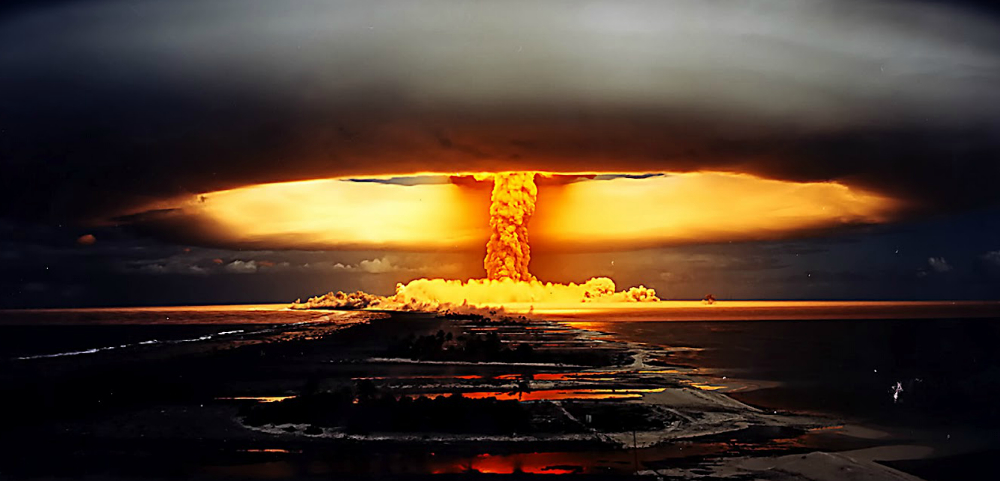The Nuclear Taboo Is a Myth

Published by The Lawfare Institute
in Cooperation With

Editor’s Note: Scholars have long argued that the risk of nuclear war is less likely than many fear because of the nuclear taboo—the belief that the use of nuclear weapons is so unthinkable that it simply would not occur. Drawing on extensive survey research, Joshua Schwartz of Carnegie Mellon University argues that the taboo is not real and that publics are more than willing to support nuclear use under many circumstances.
Daniel Byman
***
In recent years, countries have adopted increasingly risky nuclear behaviors. Vladimir Putin has issued nuclear threats in the context of the Russia-Ukraine War, violated the Intermediate-Range Nuclear Forces Treaty, leading to its collapse, and suspended Moscow’s participation in the New START Treaty that regulates strategic nuclear weapons. Donald Trump publicly threatened North Korea with nuclear use in his infamous “fire and fury” tweet and privately discussed crossing the nuclear threshold with his advisers. Joe Biden is pursuing a diplomatic agreement with Saudi Arabia under which the United States would help the kingdom build a civilian (for now) nuclear program with uranium enrichment. Iran continues to substantially increase its stockpile of near weapons-grade uranium following the disastrous U.S. withdrawal from the nuclear deal. And China is engaged in a large-scale nuclear buildup that will see the size of its arsenal double by 2030.
The Bulletin of the Atomic Scientists’s doomsday clock is just 90 seconds to midnight, the closest it has been to apocalypse in its 75-year history. This signifies “a moment of historic danger.” U.N. Secretary-General António Guterres has similarly warned that nuclear risks are the highest they have been in decades and that the threat is casting a “suicidal shadow” over humanity. Are these assessments hyperbole, or is the threat real and urgent?
Optimists argue that the probability of nuclear use is quite low for two reasons. First, nuclear deterrence: Countries fear crossing the nuclear threshold against nuclear-armed adversaries due to the likelihood of devastating retaliation. Second, the alleged nuclear “taboo”: Nuclear use is perceived as so morally abhorrent that it is not even considered by policymakers or members of the public.
Although nuclear deterrence is indeed a strong factor disincentivizing nuclear use in certain circumstances, my research indicates that optimists significantly overstate the strength of the norm against nuclear use. In particular, public support for nuclear weapons use—even by foreign countries—is shockingly high. Policymakers have also seriously considered nuclear use on many occasions. Regrettably, there appears to be no nuclear taboo.
The guardrails against nuclear use are weaker than optimists expect. Consequently, policymakers should take additional, active precautions to reduce the chances of nuclear escalation.
The Illusory Nuclear Taboo
The standard for a taboo is high. Something that is taboo, such as incest or cannibalism, is strictly prohibited in all circumstances and should not even be considered. As Nina Tannenwald, who first proposed the concept of the nuclear taboo, wrote, a taboo “connotes such qualities as absoluteness, unthinkingness, and taken-for-grantedness.” A taboo is therefore stronger than a regular norm or tradition.
Recent research suggests there is no taboo. Public opinion survey experiments conducted in the United States, China, the United Kingdom, France, and Israel reveal that a majority or near-majority of the public would support the use of nuclear weapons by their own government if doing so enhances military effectiveness or saves the lives of co-national soldiers.
However, this prior work leaves a key question unanswered. Members of the public might be willing to support nuclear use by their domestic government, but would they still strongly support nuclear attacks by foreign governments? In other words, does the nuclear taboo begin only at the water’s edge? Perhaps scholars have been searching for the taboo in the wrong place.
This is a crucial question for two reasons. First, policymakers care what international audiences think. For example, U.S. leaders repeatedly worried during the Cold War about how foreigners would react to the use of nuclear weapons, and this was a major factor that constrained the United States from crossing the nuclear threshold after 1945. Indian policymakers were also highly concerned with international reactions during the 1999 Kargil War against Pakistan, which was the first instance of a direct war between two nuclear-armed states.
Second, the assumption among policymakers is that the use of nuclear weapons would be met with opprobrium by foreign audiences. Secretary of State John Foster Dulles argued that using nuclear weapons in response to the Soviet blockade on Berlin in 1948 “would surely cost us our allies” and “we’d be finished as far as present-day world opinion was concerned.” Regarding the possibility of using nuclear weapons in Vietnam, Richard Nixon said that doing so would have resulted in “domestic and international uproar [that] would have damaged our foreign policy on all fronts.” Gen. Matthew Ridgway, who became supreme allied commander in Europe and U.S. Army chief of staff, anticipated that using nuclear weapons “would so revolt free world opinion as to leave us, quite possibly, friendless and isolated in a hostile world.”
When Foreign Countries Push the Button
In a recent article published in International Security (kindly ungated by MIT Press), I argue that this conventional wisdom among policymakers is incorrect. Due to in-group bias, which is an individual’s penchant for favoring and more positively evaluating members of their own group (“us”) than members of out-groups (“them”), I expected that the public would not be more likely to disapprove of nuclear use by allied and partner governments than by their own government. If allies and partners are viewed as part of the in-group, then the imperative for unity may outweigh ethical concerns about supporting nuclear weapons use.
I tested my argument in a series of public opinion survey experiments in the United States and India. In the surveys, I presented respondents with hypothetical scenarios in which a country might consider using nuclear weapons—for example, in a war with Iran or in the case of a terrorist group with a deeply buried atomic weapons lab. I then randomly varied the country using nuclear weapons while holding all other factors constant.
The results were striking. Public support for nuclear use was not less when allied or partner countries carried out a nuclear attack compared with when an individual’s own government did so. Absolute levels of support for nuclear use were also quite high (between 37 and 54 percent), even when it was foreign countries pressing the nuclear button.
But it should be noted that none of the targets in the experimental scenarios had nuclear weapons themselves. If they did, then support for nuclear use may have been lower. Prior research also demonstrates that presenting the public with vivid information about the human costs of nuclear use or how purposefully targeting civilians with nuclear weapons violates international law can further lower support for using nuclear weapons.
Still, these findings are inconsistent with an absolute and unthinking nuclear taboo. Many members of the public are willing to do more than just consider nuclear use; they are willing to support it.
Although there may be no widespread nuclear taboo, there does appear to be a less powerful norm against nuclear use among at least some members of the public. The hypothetical scenarios I presented respondents with are hard tests for finding evidence of a nuclear non-use norm because they highlighted the theoretical benefits of conducting nuclear strikes—benefits that included an increased chance of successfully destroying an underground terrorist atomic weapons lab or saving the lives of soldiers by ending a war with Iran more quickly. The fact that a significant proportion of respondents still opposed nuclear use under these conditions shows that there is real atomic aversion among a subset of the general public.
Furthermore, respondents did judge nuclear use by non-allied and non-partner countries more harshly than nuclear use by their own government or allied or partner countries. The strength of the nuclear non-use norm among a given audience is therefore conditional on the identity of the country pressing the nuclear button.
How to Reduce Nuclear Risks
Because there is no taboo that will constrain nuclear use, policymakers should take several steps to reduce the danger. First, the nuclear powers with the largest stockpiles—Russia, the United States, and increasingly China—should recommit to nuclear arms control and abandon quests for nuclear superiority. A return to the huge numbers of nuclear weapons stockpiled during the Cold War—as many as 70,000 between the United States and Soviet Union in the mid-1980s—is unnecessary for deterrence and unduly raises the danger of arms races and nuclear accidents. While most of the blame for the collapse of nuclear arms control should be placed on Russia, there are growing calls in the United States for a broad nuclear buildup to match the combined arsenals of Russia and China. That would be a mistake.
Second, policymakers should reprioritize preventing nuclear proliferation to countries like Iran—ideally via diplomacy, but no option should be taken off the table. If a country does not possess nuclear weapons, it cannot be tempted to employ them—taboo or not.
Third, the U.S. president and other leaders should not have unilateral authority within their own political system to launch a nuclear first strike. If leaders want to take the grave step of launching a nuclear war of choice, then they should—at the very least—be required to gain the support of other members of the government. In the U.S. context, requiring the vice president (who cannot be fired by the president) to also approve the use of nuclear weapons and the attorney general to certify that such an action is legal would be one sensible safeguard.
In short, much greater caution is warranted in a world with no nuclear taboo.





